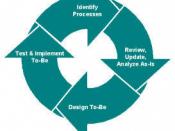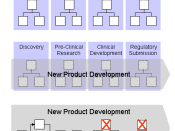In today's fiercely competitive environment quality must be emphasised through all aspects of the business, but this is more difficult than it sounds. Quality is not something that can simply be applied to a product, as there are various factors that contribute to achieving quality. So what is the best way for businesses to achieve high levels of quality?
In the past three decades Total Quality Management and Process Reengineering have emerged as popular quality management programs. These are both focused on achieving organisational change, however their goals and methods are clearly different, as I will later detail, firstly I will outline both programs using Ford as a case study.
Total Quality Management advocates consider it to be a philosophy, as it encompasses a new organisational way-of-life that emphasises the need for continuous improvement, and fulfilment of customer needs and expectations.
Within Ford appropriate training, application of technology and system evaluation, have reduced total hours worked per unit from 66 hours to 48 hours.
These change have enabled Ford to "prevent defects, rather than correcting them", fewer cars have problems and thus warranty is improved. TQM's focus on waste elimination, has also saved the company $(US) 1.7 billion worldwide and $731 million in 2003 alone.
Total Quality Management is based upon continuous incremental change, for this reason some think this is only compatible with the calm waters metaphor, and thus redundant in today's environment.
Process Reengineering stresses the need for revolutionary change within the white water rapids metaphor, by simply throwing out conventional wisdom, and applying a new system based upon meeting customer-needs. For example, Ford implemented a new global database of process knowledge where any division may access experiences of other parts of the organisation. This resulted in many decentralised, local databases being replaced with this system, enabling Ford...


